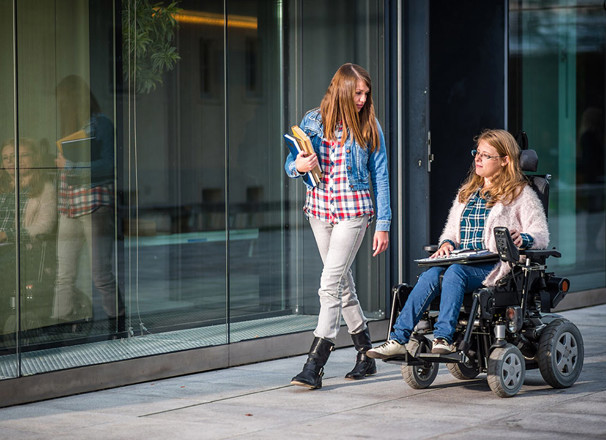There are all kinds of disabilities. Maybe you are hard of hearing or use a wheelchair. Maybe you have a learning disability or a mental health issue. Whatever your disability, supports are available. But they may be different before and after you turn 18.
Discover what you can do now so that you can head into adult life with all the help you need.
Jump to:
What to do before you turn 18
As soon as you can, get your disability documented. That means it has been diagnosed and recorded. This will help you qualify for programs and supports, although not all of them will need it. To do this, see your doctor or find one here.
If you think you have a learning disability, talk to your teacher or guidance counsellor. If you wait until after high school, you will have to pay to be tested. While you are still in school, it’s free.
Once you are diagnosed, you can apply for support at post-secondary schools.
Some agencies can help you find what you need when you turn 18. Call 211 or visit 211 Alberta. On the website, choose your location, then type “disability transition supports” into the Keyword Search box.
This planning guide can show your parents or other support people how to help you move smoothly into adult life. They may also set up a Registered Disability Savings Plan (RDSP) for you. This can be done at any time until you turn 60.
If you’ve been in care of Children’s Services
You may be able to get support and resources. Contact your caseworker to find out.
- Don’t remember your caseworker’s name? Call the office you used to go to.
- Live in a different town or region? Find your local office.
What to do after you turn 18
Becoming an adult opens the door to a lot of new choices. The right information can help you make these choices. Here are some resources:
- Finding a Place to Live as a Young Adult talks about renting, affordable housing, and shelters. Your disability may shape where you live or what kind of space you’re looking for.
- How to Grow Your Bank Account When You’re Just Starting Out walks you through opening a bank account, finding income sources, and more.
If you want more education
Continuing your schooling is a great way to get the skills you need. Check out these resources:
- Read Staying the Course: Learning Beyond High School to help you figure out the next steps on your learning path.
- Watch videos from students who’ve accessed supports to continue their education after high school.
- Learn about inclusive post-secondary options for people with developmental disabilities.
- Explore Education and Training: Resources for Persons with Disabilities to help you plan for your education.
- Check out Resources for students with disabilities for a list of supports at Alberta post-secondary programs.
- Explore Disability Related Employment Supports (DRES) for help with education, job search, and workplace issues.
- Read Grants for Students with a Permanent Disability for details on federal and provincial grants.
If you want to start working
Let’s face it: no one can do everything. And many employers now see that it’s better to focus on what a person can do—their skills—than what they can’t do. Still, having a disability means you may have extra things to think about. These resources may help:
- Landing Your First Real Job guides you through the basics, from getting a Social Insurance Number (SIN) to how a job may change your social life.
- When and How to Talk About Your Disability talks about the pros and cons of telling employers about your disability, as well as ways to tell them.
- Accommodations: Working with Your Disability explains the kinds of things you and your employer can do so you can do your work.
- Talking About Your Invisible Disability guides you through how to plan your career, whether to disclose, what to put on your resumé, and more.
- What Can Employers Ask You describes your rights as an employee.
- Job Interview Tips for People with Disabilities gives you tips on how to handle the interview. For instance, you may describe what you can do and offer examples of how this may help your employer.
- Look for Work: Resources for Persons with Disabilities provides information on funding opportunities, becoming an entrepreneur, and more.
Once you start working, make sure you apply for the federal government’s disability tax credit (DTC).
If you have a significant developmental disability, consider your options for inclusive employment and self-employment.
Exploring Self-Employment Opportunities for Persons with Developmental Disabilities (5:25)
This video describes the value of being self-employed for people with developmental disabilities and their caregivers. It highlights 3 successful businesses and how they got started.
If your disability is very limiting
Assured Income for the Severely Handicapped (AISH) offers help to adults with disabilities. The disability must be permanent and severely limit your ability to earn a living.
Resources for specific disabilities
211 Alberta lists resources from Adult Day Programs to Transportation/Parking Permits under its Disability Supports icon. You can also find programs for specific disabilities. Type “autism,” “Fetal Alcohol Spectrum Disorder,” or other topics in the keyword search to find resources that can help you.
informAlberta provides the same type of service. You can type “disability” or the name of a specific disability into its keyword search.
Find more resources
Check out:
- Connections—Read stories on topics such as disabilities and mental health.
- Office of the Advocate for Persons with Disabilities—Find supports and services for children, youth, and adults with disabilities.
- PDD Resources—Discover provincial programs and services for persons with developmental disabilities.
- Community Disability Services—Get help with employment services, assisted living, and more.
- Transition Planning Guide: A Career and Education Planning Guide for Students With Disabilities—Offers advice for the journey from high school to post-secondary education.





